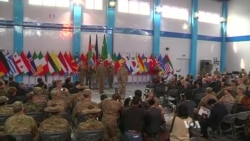The NATO-led military alliance in Afghanistan formally ended its 13-year-long combat mission, leaving a relatively under-trained Afghan national security force to fight the deadly Taliban insurgency largely on its own.
A special ceremony was organized at the Kabul headquarters of the coalition Sunday to mark the conclusion of operations by the U.S.-led International Security Assistance Force, or ISAF.
The commander of the International Security Assistance Force, U.S. Army General John Campbell, said the U.S. and NATO are not abandoning Kabul.
"Our new resolute mission means we will continue to invest in Afghanistan's future, our commitment to Afghanistan endures," Campbell said.
NATO’s Resolute Support mission will consist of about 13,000 mostly American personnel that will continue advising, assisting and training Afghan national security forces in their fight against the Taliban.
White House statement
In a statement from the White House, U.S. President Barack Obama said,
"Today's ceremony in Kabul marks a milestone for our country. For more than 13 years, ever since nearly 3,000 innocent lives were taken from us on 9/11, our nation has been at war in Afghanistan.
"Now, thanks to the extraordinary sacrifices of our men and women in uniform, our combat mission in Afghanistan is ending, and the longest war in American history is coming to a responsible conclusion," Obama said.
However, "Afghanistan remains a dangerous place, and the Afghan people and their security forces continue to make tremendous sacrifices in defense of their country," he said.
Campbell said the road ahead remains challenging.
“There is no turning back to the dark days of the past. Insurgents are losing, they are desperate. ... It is time for the enemy to heed President [Ashraf] Ghani’s call, lay down their arms, come to the peace table and help to rebuild the Afghan nation," he said.
Whether the Afghan forces can contain the insurgency remains an open question, with militants regularly launching deadly attacks against Kabul's security forces.
NATO reaction
In a statement, NATO Secretary General Jens Stoltenberg said the coalition's war against the insurgents "made our own nations safer, by denying safe haven to international terrorists. We have made Afghanistan stronger, by building up from scratch strong security forces."
Kabul resident Mohammad Salim voiced his confidence in the Afghan troops, saying, "We are satisfied by the capability of our Afghan security forces. They are now strong enough to assume security responsibility from NATO. We are proud of them.''
However, Qasim Sanjani, also of Kabul, said continued international assistance is essential.
“International security forces must give guarantees to the leadership of the Afghan government that they will stay behind our security forces in terms of training and supporting them for the long term. They must make sure that our army is fully equipped after they leave the country,” Sanjani said.
New Afghan President Ghani has pledged to seek a political solution to the insurgency and has called on the Taliban and its allies to engage in peace talks with his national unity government.
Instead, the militants have intensified attacks, citing Ghani’s move to conclude security agreements with the United States and NATO and allowing an enduring foreign military presence in the country.
Gratitude to NATO troops
Afghan National Security Adviser Hanif Atmar, while addressing the ceremony, expressed his gratitude for the efforts and sacrifices coalition forces have made to secure Afghanistan.
“Nearly 3,500 NATO personnel have been killed in action and over 30,000 NATO personnel have been wounded in action. The Afghan people pray for your fallen, wounded and their loved ones,” Atmar said.
This year has been the deadliest for Afghan security forces in their decade long battle against the Taliban and insurgents have made gains in parts of the country to extend their influence.
Atmar said Afghan forces have successfully led security operations for the past nearly two years in most of Afghanistan but underscored the need for continued international help ensure their long-term sustainability.
“We are not yet able to do everything alone. We have made tremendous progress, but we recognize that your continued support will be key in ensuring that our collective gains will be enduring,” he said.
At its peak, there were about 140,000 troops from 50 countries taking part in the ISAF operation in Afghanistan.
It was launched under U.S. leadership to invade Afghanistan 13 years ago to remove the Taliban from power for sheltering the al-Qaida network that plotted the September 11, 2001, attacks on the United States.
Washington has since spent more than $100 billion on Afghan reconstruction in addition to its estimated $1 trillion war effort.













